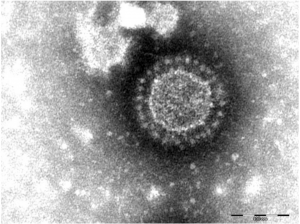Electrochemical biosensor for PEDv

Tech ID
22-059
Inventors
L. Soleymani
Y. Li
A. Victorious
Z. Zhang
R. Pandey
D. Chang
Patent Status
US provisional patent filed
Stage of Research
Proof of principle available
Contact
Carmen Carrasquilla
Business Development Manager
Abstract
In only 18 months, the highly contagious porcine epidemic diarrhea virus (PEDv) killed around 10% of the US commercial swine population in 20131. Unfortunately, existing testing strategies are time-consuming and require sample collection and transportation to central labs that produce a result in 2-4 days1. Improvements in PEDv detection can translate to lower economic loss, less food security disruptions, reduced environmental impacts of farming, and fewer animal-to-human transmissions1. Additionally, improved detection of the disease will allow for earlier implementation. Thus, there is a critical need for rapid testing of farm animals for infectious diseases, such as PEDv.
McMaster researchers have developed a rapid, simple, and reagent-less platform for on-farm detection of PEDv. The platform comprises key components including: a dual-electrode electrochemical chip (DEE-chip) and a barcode-releasing electroactive aptamer. The novel platform has a better sensitivity and specificity due to the lack of reagents required to complete the test. By using a porcine saliva sample, this non-invasive PEDv sensor is capable of pen-side operation that reduces the sample-to-result time frame down to one hour.
Applications
- Pen-side testing and detection of PEDv.
- Design versatility – can be applied to other viruses and pathogens in the future.
- Rapid and on-farm animal disease surveillance
Advantages
- Sample-to-result in 1 hour.
- Rapid detection in the control of the farmer.
- More precise and reliable identification of PEDv.
- Reagent-less electrochemical biosensor.
References
- Victorious, Amanda, et al. “A DNA Barcode-Based Aptasensor Enables Rapid Testing of Porcine Epidemic Diarrhea Viruses in Swine Saliva Using Electrochemical Readout.” Angewandte Chemie 134.31 (2022): e202204252.

